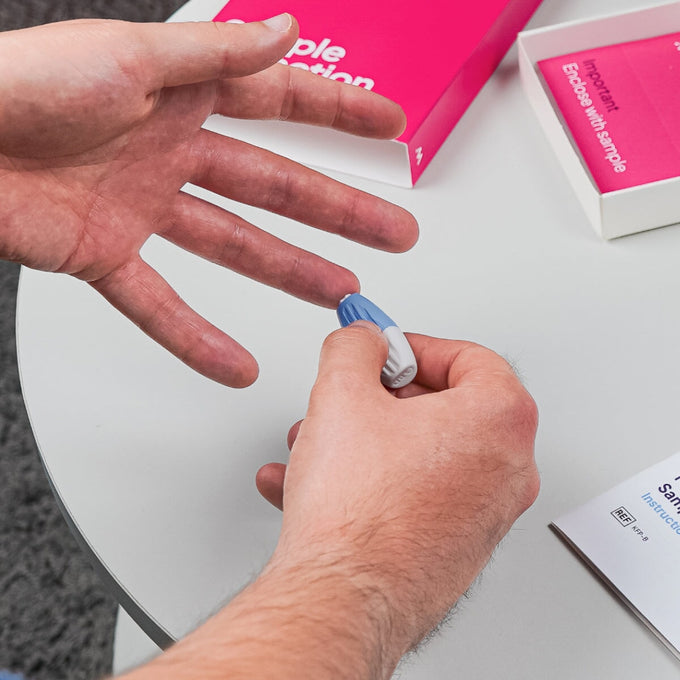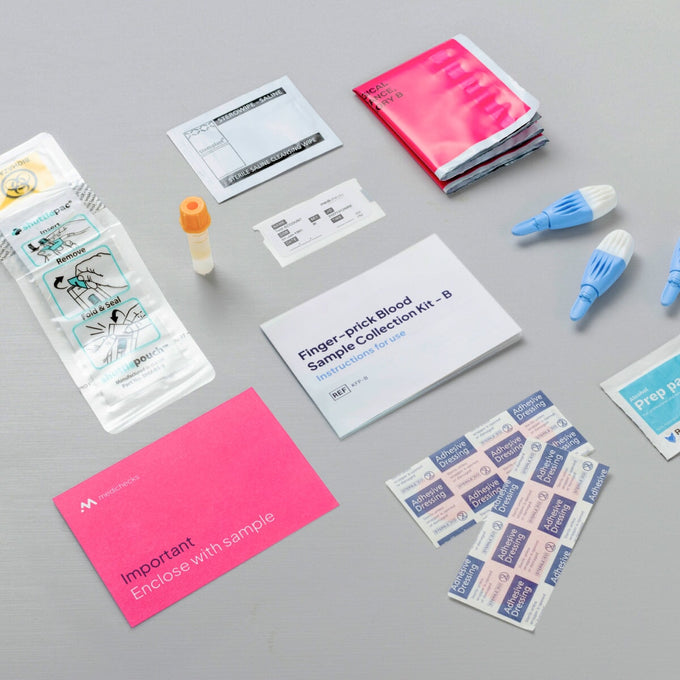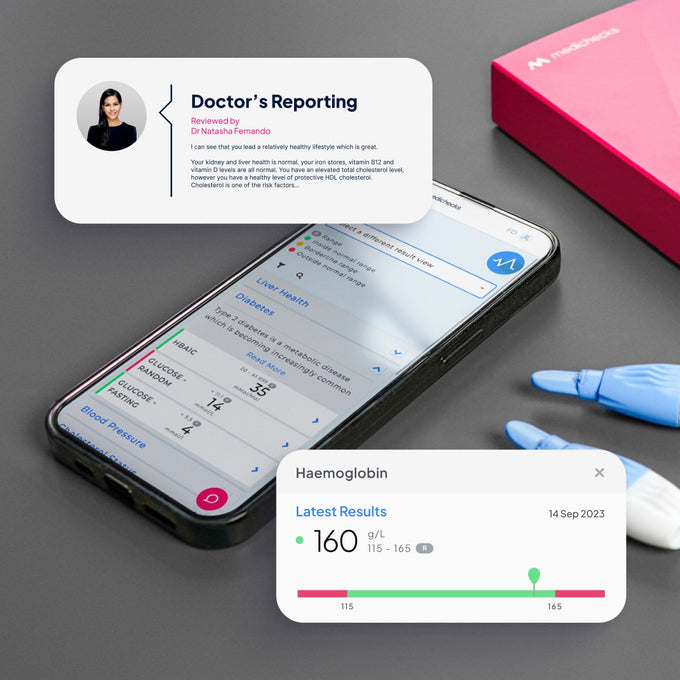Testosterone Blood Test, from our experts to you.
Dr Sam Rodgers MBBS, MRCGPChief Medical Officer

What is testosterone?
Testosterone is a sex hormone produced by the testes in men. Women also produce testosterone in their ovaries and adrenal glands, but usually in smaller quantities. Testosterone governs many essential body functions, such as sex drive (libido), energy levels, healthy bones, muscle mass, strength, and mood. It also controls sperm production, so changes in this hormone can affect fertility.
What can affect testosterone levels?
Stress levels, how much alcohol you drink, and the amount of exercise you do can all affect the amount of testosterone your body makes. Low testosterone levels can sometimes cause unwanted symptoms, such as low sex drive and low mood. Both men and women may experience a natural decrease in their testosterone levels with age.
What blood test measures testosterone?
Measuring your testosterone level is easy with our simple testosterone finger-prick blood test kit, which you can do at home or in a clinic. With our UK Testosterone Blood Test, you’ll get expert advice and follow-up on steps to take if your testosterone level is outside the normal range.
What's Included?
How to prepare for your test
Special Instructions
Prepare for your Testosterone Blood Test by following these instructions. Please take your sample before 10am.If you use hormone gels, pessaries, patches, or tablets, we strongly recommend selecting a venous sample to minimise contamination sometimes seen with finger-prick tests. Otherwise, administer any hormone supplements using gloves, and make sure your fingers have not been in contact with hormone supplements for at least four weeks before taking the test. Hormones can be absorbed deep within the skin even after minimal contact and remain there for weeks despite vigorous handwashing. Do not take biotin supplements for two days before this test, discuss this with your doctor if it is prescribed.
Frequently asked questions
Can I use this test if I am taking testosterone replacement therapy (TRT)?
The Testosterone Blood Test can be a valuable way to monitor your hormone levels whilst taking TRT. You may also be interested in our specially designed TRT Blood Test, which investigates other important bodily functions, such as your liver health.
If you take hormone gels or hormone pessaries, it is essential to wear gloves to apply them for at least four weeks before taking a finger-prick test. This is because testosterone can stay in your skin and affect the results of the blood test.
Does this test measure total testosterone or free testosterone?
Some testosterone in your blood is bound to proteins which makes it unavailable for your body’s cells. Some testosterone is unbound meaning that it is available for your body cells to use. Unbound testosterone is also known as free testosterone. This test measures the total testosterone level which is a single measure of both bound and unbound testosterone. Measuring your total testosterone level can give an indication of whether you have normal levels of testosterone in your body.
When is the best time to take the Testosterone Blood Test?
We recommend taking this test in the morning as this is when your testosterone levels are at their highest.
Can women take this test?
The Testosterone Blood Test is suitable for both men and women. Testosterone is an essential hormone for both men and women, but it is important that blood levels are within the normal range for you.
Women can experience low levels of testosterone in menopause which can lead to symptoms such as poor bone health, vaginal dryness, and reduced sex drive. On the other hand, women can experience high testosterone levels with health conditions such as Polycystic Ovary Syndrome (PCOS). Women may be interested to take the Polycystic Ovary Syndrome (PCOS) Blood Test, which is specially designed to help women find out whether their hormone levels could be contributing to symptoms of PCOS.
Does this test measure high levels of testosterone?
Most testosterone tests set an upper detection limit of 52 nmol/L. If your result is higher than this, the lab will attempt a second measurement to get an actual reading, providing there is enough sample volume available. For this reason, we recommend taking a venous sample if you are expecting an abnormally high result (for example, if you take high doses of testosterone).
What causes low testosterone levels in men?
Men naturally experience a steady decline (less than 2% a year) in testosterone levels from around 30 years of age. This rarely causes a sudden drop in testosterone levels but may contribute to low levels in older age.
Other factors which can cause low testosterone are:
- Injury or damage to the testes
- High-stress levels
- An unhealthy BMI
- Steroid abuse
- Type 2 diabetes
- Cancer treatment
- Tumours (which affect areas responsible for hormone production, such as the pituitary gland in the brain)
- Lifestyle factors (such as smoking, drinking too much alcohol, and not exercising)
- Poor sleep quality
Do testosterone levels fluctuate?
Yes, it's normal for testosterone levels to change throughout the course of the day and even from week to week. Factors such as stress, exercise, and alcohol can affect your testosterone levels.
Therefore, if you're looking to find out your baseline levels of testosterone, we recommend taking the average of at least two morning measurements, ideally before 9 am, when levels are at their highest. If your results differ by more than 25%, you may need another test for confirmation.
If your results have dropped significantly, it's worth repeating the test. Some studies have shown that up to a 50% difference in testosterone levels may be due to normal variation.
Testosterone in men
Testosterone is an essential hormone for men because it maintains male sex drive (libido), sperm production, fertility, and mood. Testosterone levels sometimes fall gradually in men from around the age of 30 years. For many men, this gradual fall in testosterone causes no symptoms. For others, it can negatively affect mood, motivation, and sex drive. Low testosterone can even cause a decrease in muscle mass in the body alongside increased fat mass and gynecomastia (breast tissue development). This age-related decline in testosterone is sometimes called the 'male menopause', 'manopause', or andropause. Some younger man can also experience low testosterone levels, this is called hypogonadism.
If you are a man who is experiencing symptoms of low testosterone, your doctor may prescribe testosterone replacement therapy (TRT).
Testosterone in women
Testosterone is an essential hormone for women because their bodies can use it to produce oestrogen. Testosterone helps control female sex drive (libido), reproductive health, mood and the menstrual cycle. If women experience a decline in testosterone levels, such as during menopause, it can cause poor bone health, vaginal dryness, and reduced sex drive.
On the other hand, if women have too much testosterone, it can cause unwanted symptoms such as excess body hair and weight gain. High testosterone levels in women could suggest a health condition known as Polycystic Ovary Syndrome (PCOS).
Testosterone in sports and exercise
Testosterone can be an advantage in sport and exercise. Firstly, testosterone helps your body build muscle and increase strength. Testosterone is also essential for energy and motivation, so it could affect the amount of exercise you can do. Testosterone could even help your body to use fat as fuel for your exercise.
Intense training without enough time for recovery can put you at risk of overtraining syndrome associated with a long-term decrease in your testosterone levels. Symptoms of overtraining include chronic fatigue, weakness, and low mood. Overtraining syndrome can be damaging to your performance and could even lead to injuries, such as fractures.
Long-term use of anabolic steroids can cause shrinkage to your testes (that produce testosterone) and lead to low testosterone levels in the body.
Can you increase your testosterone levels naturally?
There are some simple lifestyle changes that can naturally support the production of testosterone in the body:
- Get good sleep quality. Getting a full, undisturbed night of sleep is essential to support your body to regulate hormone levels.
- Optimise your exercise. Any exercise can boost testosterone levels in the short-term. But building your muscle mass through strength and resistance training is most effective at permanently increasing testosterone levels.
- Limit your alcohol intake and smoking. Alcohol can lead to disruptions in your body's ability to produce testosterone. Try to limit the amount of alcohol you drink, or better still, cut it out completely.
- Ensure good nutrition with a healthy, well-balanced diet rich in protein, carbohydrate and healthy fats is essential for supporting healthy testosterone production
- Ensure you get enough vitamins and minerals through eating plenty of fruit and vegetables.
- Get some sunlight - Vitamin D is essential for testosterone levels.
- Manage your body fat levels. Excessive body fat is associated with decreased testosterone levels in men.
- Minimise stress
Read our full guide on what is testosterone and how you can boost your levels.





